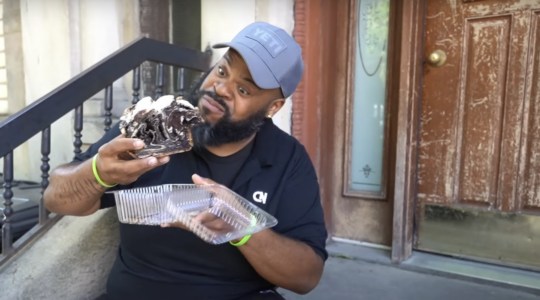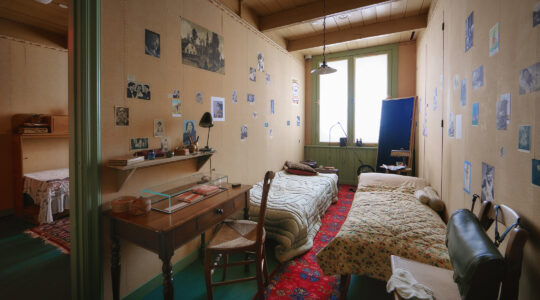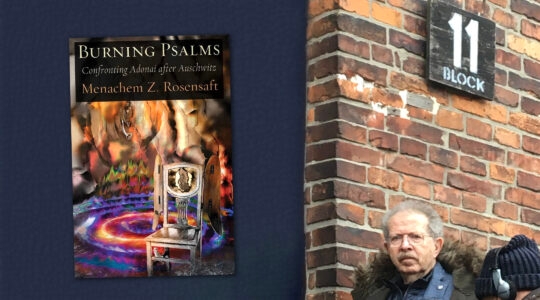A few small pieces of personalized stationery. A couple of small plastic bags. A bouquet of red-and-white chrysanthemums. A copy of Kaddish in transliteration.
Joy Yagman prepared carefully one morning last week for her trip from her home in lower Manhattan to Farmingdale, L.I., in Suffolk County, just across the Nassau border.
For the second time in a dozen years, she was going to visit her parents’ graves.
Along with nine other members of the Jewish community, mostly senior citizens, mostly residents of Manhattan, mostly unaffiliated, she was taking part in a grave visitation program sponsored by Plaza Jewish Community Chapel and the Marlene Meyerson JCC Manhattan, in partnership with several local synagogues and other Jewish organizations.
For the last five years, Plaza and the JCC have brought a few hundred men and women to 15 Jewish cemeteries in Greater New York, most on Long Island and in New Jersey.
For the participants, the trek by themselves is unwieldly and expensive, usually prohibitive.
For Yagman, 68, who once worked in social work and now has entered an “encore career” as a part-time coordinator of a senior adults’ education program, the trip was too demanding.
Last year, she went, accompanied by her daughter Karen, by LIRR and cab.
This year, she signed up for the Plaza-JCC program. Her parents — Abraham, who died in 1987, and Lillyan, who died in 2006 — are buried side by side in the Wolkowinitzer-Podolier Aid Society section of Beth Moses Cemetery, Block 20, Row 4.
A light breakfast of sliced fruit and a brief orientation and wishes from Rabbi Miriam Wajnberg, the JCC’s director of adult Jewish learning and interfaith engagement, for a “day filled with meaning” came first. Black kipas for the men’s heads and small black rocks for the graves, maps of the cemeteries, and bags with bottles of water and high-nutrition snack bars were offered.
Then the participants, a jeans-and-sweater crowd, and accompanying rabbis, piled into three black Ford Lincolns parked out front, which looked eerily like a small caravan of hearses.
Then, onto Farmingdale, 41 miles away.
Jewish tradition encourages people who have lost a loved one to make a graveside visit during Elul, the month before the High Holy Days, as a sign of respect for the deceased and as a reminder of one’s mortality.
Plaza and the JCC offered four grave site visits this year — two during the week before Rosh HaShanah, and two last week, following the last of the Tishrei holidays.
The program grew out of a conversation that Rabbi Joy Levitt, executive director of the JCC, had six years ago with Stephanie Garry, Plaza’s chief administrative officer.
“Rabbi Levitt told me of the need that seniors in the community had to find ways to visit graves of family members and friends around holiday time,” Garry said. “We heard stories that some people would take two buses and a train and then a taxi to get to a cemetery — then once there, they had to find their way to the grave. And then, the way back.”
Or some would take Uber, a $150 ride.
“Plaza said we are here to help,” Garry said.
“This is part of our mission,” said Rabbi Wajnberg. “It fills an obvious need. We can do it with a simple car ride.
“It’s not just a field trip,” the rabbi said. “It is a schlep.”
Plaza (plazajewishcommunitychapel.org), a 17-year-old not-for-profit corporation founded by a group of philanthropists and local Jewish organizations, offers the grave site visits as a supplement to its array of education programs for Hebrew schools, rabbinical and cantorial students, and the general public.
Garry said she knows of no other Jewish funeral home that sponsors such a program.
Availability, announced by participating shuls and organizations, fills up quickly; there’s a waiting list each year.
“This is very important,” said Rabbi Joseph Potasnik, executive vice president of the New York Board of Rabbis. These visits are “one of the most precious mitzvot in our tradition.”
If the program — tentatively titled “Days of Awe” — were not offered, said Garry, most of the participants would not be able to visit the graves.
This is especially true in the New York City area, where the cemeteries in which most Jews are buried are far from the five boroughs. And where there is a growing number of aging, isolated Jews who don’t drive. “There is more need for this,” Garry said. “It’s part of a trend. There is a growing need in the Jewish community to address end-of-life [issues].
“We want to make it as simple as possible for the families who want to go,” she said. “We want to make it a very personal, sacred experience.”
The rabbis come along in the limos to set a tone of reverence during the ride, to offer some graveside prayers if the family members so desire, and to lead a brief prayer service afterwards. To just listen. Or to stand aside, if the family members prefer privacy.
“The only guideline is we make sure that people do not walk anywhere alone,” Garry said. Many of the men and women use canes, and have limited mobility.
Plaza and the JCC charge a nominal $10 fee for the service, to ensure that everyone who signs up shows up.
There’s little worry about that.
One year, Garry said, the morning began with “torrential rain.” She feared some people would stay home, but, “Everybody showed up,” she said.
By the time the convoy reached the Long Island cemeteries, “the sun came out.”
On the ride out, the mood is relatively subdued, the passengers discussing their health, family burial plots and the individuals whose graves they will be visiting. The mood lightens on the ride back, with talk of jobs and kids.
Each person stays at the grave site about 10-15 minutes, sometimes reciting Psalms or doing minor repairs and cleanup.
Most leave a stone atop the headstone.
Garry said she offered one woman, who was visiting her father’s grave, some small stones a few years ago. The woman said no thanks. “I don’t need your stones. I brought stones from my father’s garden.”
Yagman, in good health, walked unescorted to her parents’ graves last week.
Under an overcast sky, a slight wind rustling the nearby trees and the chirping of birds providing a subdued soundtrack, she placed handwritten notes to each parent in a plastic bag, and lay a few flowers on each grave. She said a few words to each parent. And she shed a few tears at the end. Then she walked back to the waiting limo.
It was a well-spent few hours.
Next year, “for sure,” she said. “I need to do this more often.”
steve@jewishweek.org
The New York Jewish Week brings you the stories behind the headlines, keeping you connected to Jewish life in New York. Help sustain the reporting you trust by donating today.




